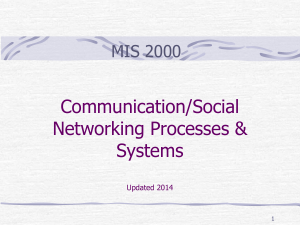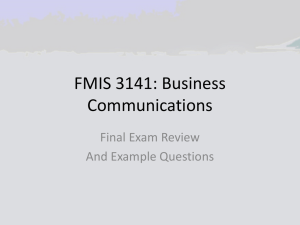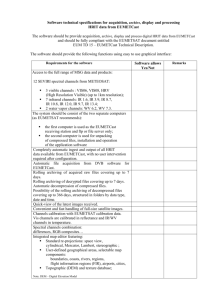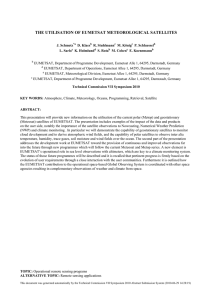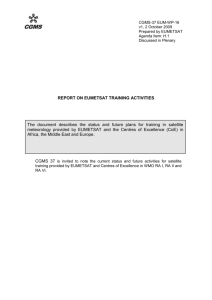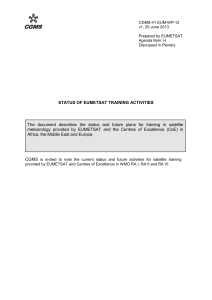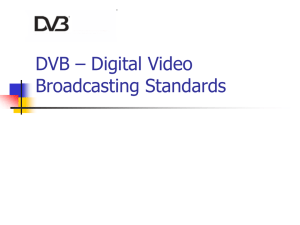David Taylor (PowerPoint)
advertisement
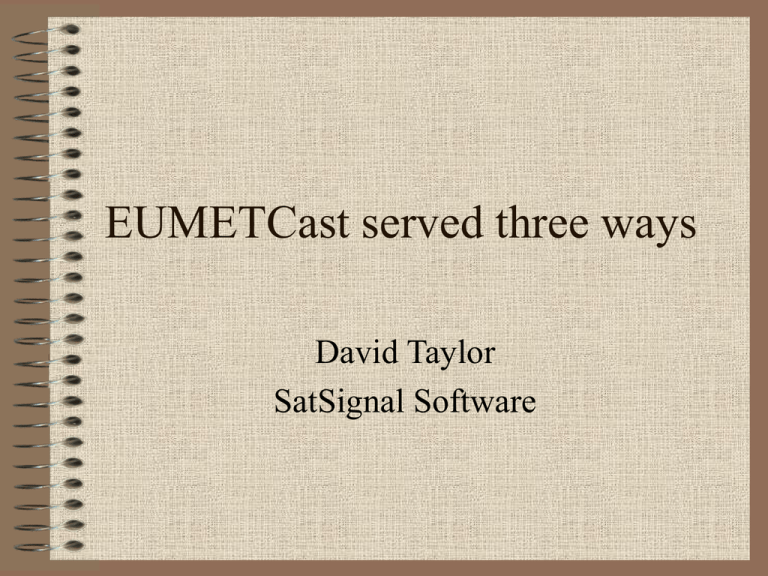
EUMETCast served three ways David Taylor SatSignal Software Basics of EUMETCast • It’s a network link between EUMETSAT in Darmstadt and your home. • Packets of data are sent out from EUMETSAT (actually from Usingen). • They look like digital TV signals but have more robust protection. • Your job is to capture them. Usingen ground station Usingen older antennas Packets to files • Need to convert DVB (digital video broadcast) packets into data packets, like those sent over your Wi-Fi or LAN. • Packets are broadcast to your network, so you need a “network card” to receive them. • The TelliCast software converts the packets to files, and needs to know your “network card” address. 1 - Served with a SkyStar card • PCI card inside your PC • Software installation adds device driver named SkyNET.sys • Appears as a new network card • IP address: 192.168.238.238 • You set this yourself in Control Panel • DHCP is not used 2 - Served with a DVB World box • USB box outside your PC • Software installation adds device driver named DVBNet.sys • Appears as a new network card • IP address: 192.168.238.238 • You set this yourself in Control Panel • DHCP is not used 3 - Served with an IP receiver • New network card inside your PC • Or motherboard port if you use Wi-Fi for your “house network” • Software installation adds device driver – Windows usually does this automatically. • IP address: 192.168.10.103 • You set this yourself in Control Panel • DHCP is not used PC changes for IP receiver • • • • TelliCast software – unchanged SatSignal processing software –unchanged Recv-channels.ini – unchanged Update recv.ini: – [parameters] – # interface_address=192.168.238.238 – interface_address=192.168.10.103 Later DVB S2 changes • Re-point your dish when the new service is available. • Adjust for new service parameters. • Maybe you will need a bigger dish? Which receiver? • Ayecka SR 1 – dual receivers – two LAN ports for Management & Traffic – USB serial port for initial setup. • Novra S300E – single 100 Mb/s LAN port – single receiver. See: http://www.satsignal.eu/wxsat/dvb-s2/ Ayecka SR 1 (edited from EUMETSAT guide) Novra S300E (from EUMETSAT guide) IP Receiver settings • For the Ayecka SR 1 receiver, EUMETSAT provide a file which can be used to configure automatically. – Requires the USB serial connection enabled • Manual configuration possible. – over a USB serial connection – over a telnet session to the management port What can possibly go wrong! • Dish issues • Network issues LNBs too far apart LNB fallen off LNB pointing in the wrong direction Wrong IP address • Tempting to use the address of the IP receiver when editing recv.ini. • Not right! You need the address of the network card in the PC. • Not the address of the sender • But the address of the receiving card Not using a separate network • The full EUMETCast stream which comes out of the IP Receiver will saturate a Wi-Fi or 100 Mb/s network. • So use a separate LAN • Not complicated – simply connect a network lead between the IP Receiver and a port on your PC. Using poor cables or 100 Mb/s network • Using 100 Mb/s switch and random cables, found some odd missed packet events in early tests, but most packets recovered. • Not seen since using 1 Gb/s switch and 1 Gb/s LAN cards. • Should check cables are “gigabit” certified. Need to wake network card? • On one PC, found the need to PING the remote receiver before starting TelliCast. • Perhaps the LAN port sleeps even though UDP packets are present? • Solved with a simple .CMD file – – – – – PING <LAN adapter> Wait a little PING <SR 1 receiver> Wait a little Start tc-recv.exe What can go right? • Add a £20 5-port Gigabit switch and you can feed up to four PCs with EUMETCast data – e.g. to spread the processing load. – Each PC needs TelliCast software & and eToken • Generally, receiver performance is better than we have been used to. – More modern design – Professional, not consumer-level design. • Ayecka receiver provides limited SNMP, allowing performance monitoring and logging. Conclusions • Update receiver hardware • Change one line in recv.ini • Dish re-pointed when S2 starts .. and you are up and running! .. all being well! Acknowledgements • To Ayecka, Novra and GEO for procuring test receivers. • To EUMETSAT for providing User Guides • To David Simmons, Alan Banks and others for their testing and for discovering some of the issues and asking helpful questions! Questions?



